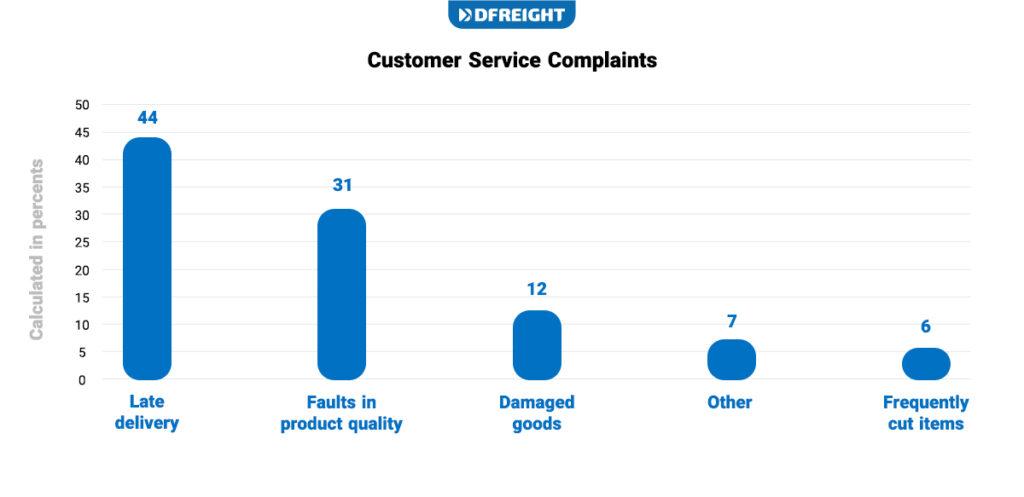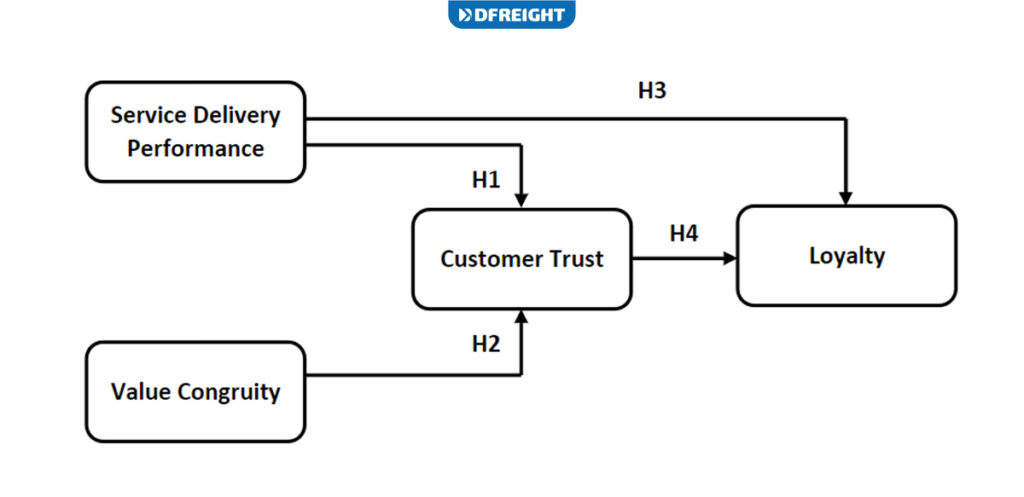Logistics customer service is a vital part of the logistics industry. After all, your customers are entrusting you with their shipments, and they expect to receive excellent service. You can do a few key things to enhance customer service in your logistics business. Customer service is a term used to describe how businesses interact with their customers. Good customer service is often seen as a way to create repeat customers and keep them returning for more. Let’s look at how critical this issue is in the logistics business.
Table of Contents
Defining Customer Service in the Field of Logistics
Customer service is used a great deal in the business world, but its meaning can be elusive. This is because the term can encompass many activities and behaviors that contribute to the overall customer service experience. In logistics, customer service is concerned with moving goods and materials from one point to another and ensuring that they arrive safely and on time.
The customer service process in logistics begins with the initial contact with the customer. This could be via phone, email, or in person. During this initial contact, the logistics company must establish the customer’s needs and requirements. They will also need to provide the customer with information on the company’s capabilities and services. Once the customer’s needs have been established, the logistics company will develop a plan to meet those needs. This plan will ensure that the customer’s goods are transported safely, securely, and on time.
The next stage of the customer service process is transporting the goods. This stage will involve coordinating several different activities, including loading and unloading the goods, planning routes, and managing any delays or problems that may occur in the supply chain. Throughout this stage, the logistics company will need to maintain regular contact with the customer, keeping them updated on the status of their shipment.
The final stage of the logistics customer service process is the delivery of the goods to the customer. This stage will involve the unloading of the goods and the delivery to the customer’s premises. Once the goods have been delivered, the logistics company will conduct a final check to ensure that everything has been agreed upon. They will also take this opportunity to thank the customer for their business.
Customer service is a vital part of the logistics process, and companies must take steps to ensure that their customer service is of the highest possible standard. There are many ways to achieve this, but some of the most important include maintaining good communication with the customer, being responsive to their needs, and delivering on their promises.
If your logistics customer service is poor, it will reflect poorly on your business. Logistics customer service is the process of handling customer inquiries and complaints. This may include providing information about the status of an order, tracking a shipment, or resolving a billing issue. Customer service representatives may also be responsible for upselling products or services or providing customer service through live chat or phone. Providing excellent logistics customer service can help to build customer loyalty and maintain a positive reputation. DFreight provides the best possible service to its customers at every stage, and with transparency and high efficiency, you don’t have to worry about transporting your cargo.
Logistics Customer Service Enhancement and Its Importance
Logistics customer service ensures that customers receive the products and services they need when they need them. It is a critical part of the supply chain and can significantly impact a company’s bottom line. Enhancing logistics customer service can be challenging, but it is essential to consider all aspects of the customer experience. Every touchpoint should be considered when creating a strategy to improve customer service, from the initial contact to the final delivery. The most crucial part of logistics customer service is ensuring that orders are fulfilled on time and as promised. This can be challenging, but it is essential to meeting customer expectations.
Customer satisfaction is very important for logistics companies seeking competitive advantage, because they realize that if they do not satisfy the expectations of customers, their place will be taken by other companies whose activities will be more concentrated on customer expectations.
Procedia-Social and Behavioral Sciences
In addition, orders must be accurate and complete. If there are any issues with the order, the customer should be contacted immediately to resolve the issue. Another vital aspect of logistics customer service is providing tracking information. Customers should be able to track their orders from start to finish. This information should be updated in real-time so that customers can always know where their order is and when it will be delivered. Finally, it is crucial to create a process for handling customer complaints. Complaints should be taken seriously and addressed quickly. Customers should feel like their concerns are being heard and that they are being treated fairly.
There are also more details such as:
- Automate repetitive tasks.
- Use technology to your advantage.
- Simplify your processes.
- Train your team members.
- Delegate tasks
- Set clear expectations.
- Hold team members accountable.
- Measuring and tracking performance
- Provide feedback.
- Continuously improve
Tips for Delivering Excellent Customer Service in the Logistics Industry
In the logistics industry, excellent customer service is essential for maintaining strong client relationships. There are a few key things to remember when delivering logistics customer service. First, it is vital to be responsive to customer inquiries and concerns. Second, it is necessary to provide accurate and up-to-date information about shipments. Finally, it is crucial to be flexible to accommodate customer needs. These tips will help you provide excellent customer service and build long-lasting relationships with your clients.
Keep these points in mind to enhance logistics customer service:
- Ensure you have a clear and concise process for handling customer inquiries and complaints. This will help ensure that your customers feel heard and that their concerns are addressed promptly.
- Focus on training your employees in customer service. This will help ensure they can handle customer interactions professionally and courteously.
- Make sure you constantly evaluate your customer service process and make necessary improvements. By continually striving to improve your customer service, you will ensure that your business remains competitive in logistics.
The primary causes of customer dissatisfaction in the logistics customer service sector are depicted in this chart; you can use this information to help you develop a customer satisfaction plan.

How to create a better customer experience?
The logistics industry is vital to the economy but often struggles with providing a good customer service experience. There are a few key ways to create a better logistics customer service experience:
- As mentioned before, make sure your employees are adequately trained in customer service. This includes teaching them how to handle difficult customer service situations.
- Use technology to your advantage. Many software programs and online tools can help streamline the customer service process.
- Be responsive to customer feedback. Make sure you constantly monitor customer feedback and use it to improve your customer service experience.
- Be proactive about solving customer service problems. Don’t wait for customers to come to you with problems, but actively seek ways to improve the customer service experience.
Following these tips can create a better logistics customer service experience.
The infographic below shows the relationship between loyalty, customer trust, service delivery, and value congruity. To achieve customer loyalty, perform all shipping and delivery steps correctly and carefully.

The Benefits of Enhancing Customer Service
The logistics industry is responsible for the transportation and storage of goods. Enhancing customer service in the logistics industry can have many benefits. Better customer service can lead to increased customer satisfaction, repeat business, and referrals. It can also lead to increased efficiency and lower costs. A well-run logistics operation depends on satisfied customers. When customers are happy with their service, they are more likely to use the same company again and recommend it to others. Enhancing customer service can also lead to increased efficiency and lower costs. By streamlining operations and improving communication, logistics companies can improve their bottom line while still providing excellent service.
According to a survey conducted by Fansuri Munawar et al., timeliness, order accuracy, information quality, assurance, and personnel contact quality have a positive and significant effect on customer trust; then, customer trust has a positive and significant impact on loyalty.
In the video below, you learn about customer service, how to provide it, and the outcomes professionally and effectively.
Challenges in Logistics Customer Service
Many companies view customer service as a necessary evil that must be done to keep customers happy but is not a core part of the business. Other companies, however, see customer service as a critical differentiator that can give them a competitive advantage. The challenges in logistics customer service can be broadly divided into two categories: operational challenges and people challenges.
Operational challenges include ensuring that orders are fulfilled accurately and on time, that products are delivered to the customer in good condition, and that customer inquiries are handled promptly. People’s challenges include ensuring that customer service representatives are properly trained and have the necessary skills to provide good service, that they are motivated to provide good service, and that they are treated well by the company to stay in their jobs.
Operational challenges in logistics customer service can be difficult to overcome because they often require changes to how the company does business. For example, if orders are frequently being shipped late, the company might need to invest in new software to help track orders and monitor shipping times. Or, if products are commonly damaged in transit, the company might need to invest in better packaging materials. These changes can be costly and time-consuming and might not always be successful.
People’s challenges in logistics customer service can be just as difficult to overcome as operational challenges. For example, if customer service representatives are not properly trained, they might not be able to provide good service. Or, if they are not motivated to provide good service, they might not put forth the effort required to do so. Additionally, if the company does not treat customer service representatives well, they might quit their jobs, exacerbating the problem.
The best way to overcome challenges in logistics customer service is to have a clear understanding of what the challenges are and to develop a plan to address them. Once the challenges are understood, the company can develop strategies to overcome them. For example, if the company understands that late shipments are a problem, it can create a plan to improve its shipping times. Or, if the company understands that damaged products are a problem, it can develop a plan to improve its packaging materials. By considering these challenges, logistics providers can help to ensure a smooth and efficient customer service experience for their clients.
Conclusion
In conclusion, enhancing customer service in the logistics industry can have many benefits. There are many reasons to focus on customer service, from increased customer satisfaction to lower costs. By following the tips in this article, you can improve the customer service experience in your logistics business and ensure your company remains competitive in this field.
Suppose you’re one of those who values excellent cargo handling, a respectful response, assistance, and a positive work experience. In that case, we have the perfect solution for you! DFreight will help you resolve all your worries, keep track of your shipments, schedule pickups, and track your drivers. For a unique collaborative experience, contact our specialists.
How can I measure customer service effectiveness?
You can use key metrics to measure customer service effectiveness, such as customer satisfaction rating, first contact resolution rate, customer effort score, net promoter score, customer churn rate, average handle time, and average speed of answer.
How can I create a customer service plan?
Creating a customer service plan involves mapping out the steps you need to take to provide excellent customer service. This includes defining your customer service goals, identifying your target customers, analyzing your customer service processes, implementing best practices, measuring customer service effectiveness, troubleshooting customer service issues, and improving customer service efficiency.
How can I avoid common customer service mistakes?
You can avoid common customer service mistakes simply by avoiding these items: not listening to the customer, not being clear in your communication, not being helpful or knowledgeable, not being responsive or timely, being rude or unprofessional, being negative or discourteous, being inflexible, being unable to handle difficult situations, failing to follow up with the customer, and ignoring customer feedback.














